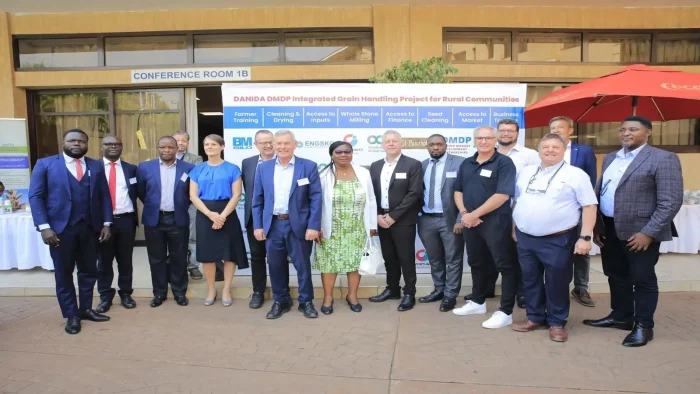
Uganda launches Integrated Grain Handling Project for rural communities
The Danish government has, through the Danish Development Agency (DANIDA) launched the Integrated Grain Handling Project for rural communities to help farmers improve grain standards in Uganda.
The launch follows recent incidents regarding the quality of grain, mainly maize.
The project is supported by the DANIDA Market Development Partnerships (DMDP) in collaboration with three Danish partners including BM Silo, Engsko, and Buurholt, and 2 Ugandan partners Ag Ploutus and Opportunity International.
The launch was graced by Humphrey Mutaasa, the managing director of agripoint initiatives limited.
Speaking during the launch, Mr Mutaasa said that there are many setbacks to the agriculture sector that the new program seeks to address.
He noted that the program has been designed to address some of the challenges in the grain value chain, targeting farmer yields, post-harvest quality of grain, and improving livelihoods with access to quality add-value markets.
In general, the program is to work with organized farmers groups, processors, and off-takers and will provide support in areas of supply and installation poor harvest cleaning and drying, whole grain milling, seed cleaning equipment, farmer support training in financial literacy, access to inputs, and finance.
The Ambassador of Denmark to Uganda, Signe Winding Albjerg, says the climate unpredictability is also becoming a big challenge to post-harvest handling for Ugandan farmers as sometimes dry weather suddenly turns into rain, affecting the drying grain.
Henrik Anker-Ladefoged, the regional director for Access2innovation said the four-year project will help address some of the challenges facing the agricultural sector in Uganda.
Officials said the project will also help farmers access finance for equipment, input, and output markets among others.

Lack of reliable data holding Uganda’s agriculture sector back
During the ceremony, Humphrey Mutaasa, the managing director of agripoint initiatives limited showed concern over the scarcity of high-quality and timely data in agricultural systems.
According to him, the lack of data is complicating planning for Uganda’s agricultural sector and holding it back.
“Data is a needed ingredient in any planning. If you don’t have data or intelligence, you don’t have evidence and this means you are just guessing in whatever you do, he noted.
According to him, a lack of appropriate data is hindering investors in agriculture since for someone to invest, they are required to understand the sector fully.
“Someone wants to come and invest in the sector but doesn’t know the soil PH, where arable land is, which grains are grown in which areas, and many other details”,Mr Mutaasa noted with concern.
He said reliable data would help in the development of the agriculture sector but says its absence is a major setback.
The official from agripoint initiatives limited also noted the market for Ugandan products is not regulated and that everyone does whatever they want.
“We must have regulated trade in this country. How do you allow people to buy not only from the farmers but also buy farms? Where else has it happened that a foreigner comes to the garden and buys farms? This needs to be regulated.”
